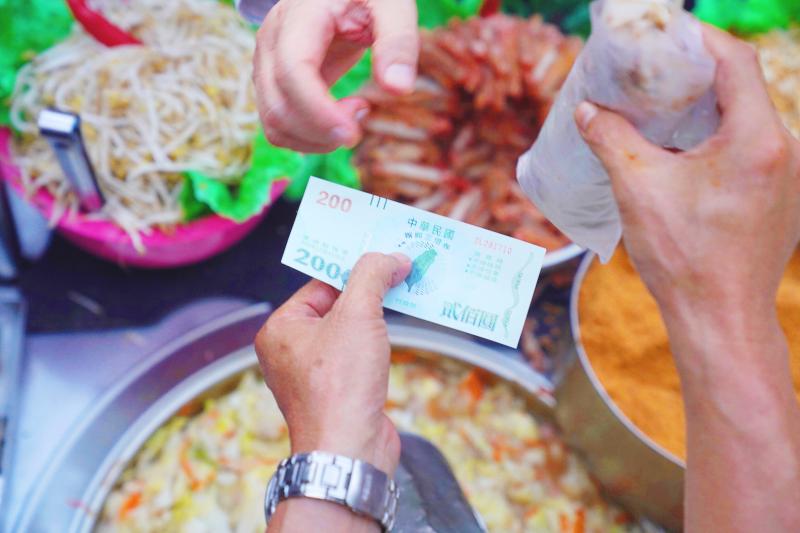A survey by Cathay Financial Holding Co (國泰金控) on how people planned to use their Triple Stimulus Vouchers found that 42 percent would buy daily groceries, the company said yesterday.
Other top uses included department store spending (24.2 percent) and travel (14.6 percent), while 6.3 percent of respondents would use them for dining and drinks, and less than 1 percent plan to use them for arts and culture activities, while 11.6 percent of respondents said they had not made up their minds, the survey found.
While travel was not a popular option, a clear majority of respondents (62.1 percent) said that they would consider spending more at hotels, given the subsidies offered by the Ministry of Transportation and Communications, the survey found.

Photo: CNA
A survey in April found that just 34.2 percent of respondents said that they would be encouraged by such subsidies, even though the poll found that consumers’ willingness to travel was rebounding as the COVID-19 threat to Taiwan appeared to be receding.
The ministry last month announced a NT$3.9 billion (US$131.91 million) program to encourage people to travel domestically — either as part of a tour group or individually — between July 1 and Oct. 31.
Each person in a tour group would receive NT$700 per day for accommodation, while individual travelers would get NT$1,000, although those visiting the nation’s outlying islands would receive more, it said.
Meanwhile, 37.5 percent of respondents expected the economic situation to improve in the next six months, down from 42 percent from last month’s poll, which might be attributed to the fact that COVID-19 pandemic is still going strong in many other nations, Cathay Financial said.
However, 33.1 percent would consider making big purchases over the next six months, a slight increase from the 31 percent last month, the poll found.
The poll was conducted from July 1 to July 7 among Cathay Financial’s clients, collecting 21,260 valid responses, the company said, without giving a margin of error.

NEW IDENTITY: Known for its software, India has expanded into hardware, with its semiconductor industry growing from US$38bn in 2023 to US$45bn to US$50bn India on Saturday inaugurated its first semiconductor assembly and test facility, a milestone in the government’s push to reduce dependence on foreign chipmakers and stake a claim in a sector dominated by China. Indian Prime Minister Narendra Modi opened US firm Micron Technology Inc’s semiconductor assembly, test and packaging unit in his home state of Gujarat, hailing the “dawn of a new era” for India’s technology ambitions. “When young Indians look back in the future, they will see this decade as the turning point in our tech future,” Modi told the event, which was broadcast on his YouTube channel. The plant would convert

‘SEISMIC SHIFT’: The researcher forecast there would be about 1.1 billion mobile shipments this year, down from 1.26 billion the prior year and erasing years of gains The global smartphone market is expected to contract 12.9 percent this year due to the unprecedented memorychip shortage, marking “a crisis like no other,” researcher International Data Corp (IDC) said. The new forecast, a dramatic revision down from earlier estimates, gives the latest accounting of the ongoing memory crunch that is affecting every corner of the electronics industry. The demand for advanced memory to power artificial intelligence (AI) tasks has drained global supply until well into next year and jeopardizes the business model of many smartphone makers. IDC forecast about 1.1 billion mobile shipments this year, down from 1.26 billion the prior

People stand in a Pokemon store in Tokyo on Thursday. One of the world highest-grossing franchises is celebrated its 30th anniversary yesterday.

Zimbabwe’s ban on raw lithium exports is forcing Chinese miners to rethink their strategy, speeding up plans to process the metal locally instead of shipping it to China’s vast rechargeable battery industry. The country is Africa’s largest lithium producer and has one of the world’s largest reserves, according to the US Geological Survey (USGS). Zimbabwe already banned the export of lithium ore in 2022 and last year announced it would halt exports of lithium concentrates from January next year. However, on Wednesday it imposed the ban with immediate effect, leaving unclear what the lithium mining sector would do in the